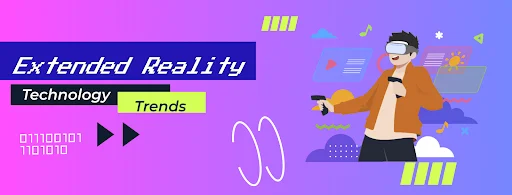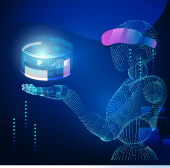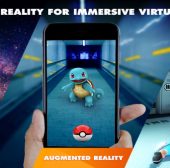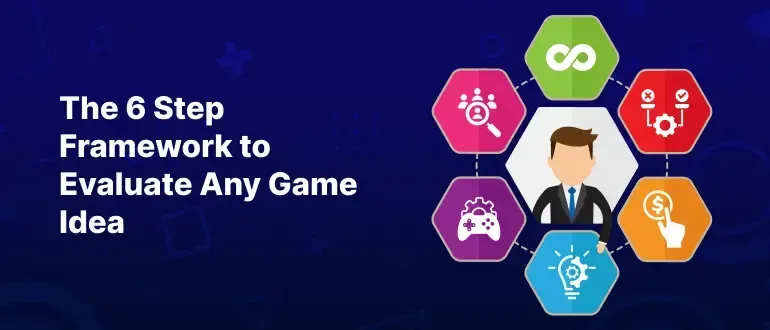Extended Reality or XR is a technology transforming the business landscape across different industries. XR covers augmented, virtual, and mixed reality and an extensive range of real and virtual environments. Its capabilities go far beyond our imagination, which comes with the possibility of these technologies working together in diverging ways. To better understand how this technology has unfolded so far, we need to get our heads around Augmented Reality, Virtual Reality, and Mixed Reality.
Augmented Reality or AR is a process where the system overlays the digital content over real-world environments in real-time. This amalgamation of the physical and virtual worlds works towards improving the viewer’s virtual experience, optimizing productivity, and solving problems more quickly.
Virtual Reality or VR helps us create a simulated environment using computer technology (hardware and software) where objects and environments look and feel real. The life-like environment is experienced using Virtual Reality headsets or other VR gadgets.
Mixed Reality is a blend of augmented and virtual reality to make the 3D experience more real and immersive. MR uses sensors, cameras, and other AI-enhanced technology to process data and use the generated information to develop digitally-enhanced experiences.
There are a vast number of use cases of Extended Reality as the technology is impactful and has great social relevance. Seamless interaction between the real and virtual worlds allows businesses to work and collaborate with minimum human error and escalated efficiency.
Explore the groundbreaking trends in Extended Reality technology shaping the future. Dive into our latest insights to stay ahead in this rapidly evolving field.
Extended Reality Applications in Businesses

Extended Reality in Video Gaming and Entertainment
The very first few applications of extended reality technology were seen in the gaming and entertainment industry, primarily through augmented and virtual reality. XR has offered game app developers new and innovative opportunities to create and offer immersive and interactive experiences at a whole new level. To boot, the constantly updating hardware and consoles like large and advanced screens, spatial sound solutions, powerful headsets, and controllers are leveling up the process of developing 3D games and experiences. An Artificial Intelligence system within an Extended Reality landscape strengthens the interaction between the gamers and the environment.
Integrating advanced AI-enabled gesture recognition into gaming enhances the first-person gameplay experience and makes it more organic and enveloping. Metaverse not just includes you in the internet space but also lets you participate and digitally immerse yourself in that 3D space using VR or XR headsets. It unlocks new opportunities for the users to learn, play, and communicate on the spatial web.
Apart from in XR game development, the capabilities of XR step up the experience of the consumers while listening to live music, watching videos, and attending sports events and exhibitions. The XR accessories and products like VR headsets, shoes, glasses, gloves, sensory masks, lounges, treadmills, and others turn your organs into smart data-collecting machines, facilitate interaction, and dynamize your experience.
Discover how our cutting-edge XR solutions can elevate your gaming and entertainment projects to new heights.
Extended Reality for Employees and Consumers
Training or imparting education to employees in virtual environments is a transformative turn in the domain and is also cost-effective for businesses. Extended Reality technology has made it easy, quick, and cheap for organizations to transfer information or data to employees and experts. If need be, it can also remotely connect an expert with a real-time issue for immediate advice and attention. This helps in avoiding redundant slowdowns and strengthens the customer experience.
Customers expect brands to promptly take care of their needs and any queries they may have. And certainly, digital media and tools have given them the power to make or break the online reputation of a brand. When one brand offers a great customer experience, they raise the bar of quality service and so the same is expected from other businesses. Customer experience can be amplified by leveraging technology to create efficient products, streamline processes, maintain data flow, manage contacts, and make interactions faster. Extended Reality here, helps you build customer-centric strategies that are relevant, responsive, and pragmatic. AR and VR offer customers a dynamic experience and enrich their overall experience, something they wouldn’t want to miss.
Extended Reality in Healthcare
VR technology is contributing to healthcare via different domains, like pharmaceutical development, physiotherapy, mental well-being, and others. This is streamlining medical procedures and improving patient care. Surgeons can now view organ complexities in 3D which helps them carefully plan every step of surgery ensuring the medical procedure is safe. It wouldn’t be wrong to say that like any other industry, XR is revolutionizing the health and medical industry as well.
Extended Reality in Marketing
Content creation, content storage, content analysis, sales communication, and certain SEO and game marketing strategies are metrics that optimize marketing enablement. And, Extended Reality technology reorients the mechanics involved in optimizing marketing and sales. Reality Technology can be used to create interactive campaigns for customers, showcase products that can be experienced before making a purchase, and offer the customers a virtual experience of service before a real one with AR-powered applications.
The “try before you buy” sales model that is very popular among big brands uses this marketing strategy through XR which lets the user try on products and services at home before they buy them. Some businesses offer a 360-degree video with hotspots to experience the brand and its services. The marketing strategies that businesses can execute nowadays are innovative, advanced, and intelligent, all thanks to Extended Reality.
Extended Reality in Manufacturing
While laying out the use cases of XR in manufacturing, it becomes necessary to begin the list with the exceptional training strategies that XR has to offer. The training opportunities with Extended reality enable a trainee to develop skills with step-by-step digital instructions inclusive of real-world equipment. This reduces the training cost, ensures efficient training processes, and offers a safe training environment. Manufacturers have built educational platforms with a library of custom interactive training scenarios.
Other than that, it provides real-time collaboration between manufacturers, teams, technicians, and others. This efficient partnering increases productivity and reduces downtime. The quality of products and services also improves and the time between the product design and its commercial manufacturing decreases.
The future prospects of Extended Reality are unimaginable and leveraging this technology to its maximum potential can require unstinting effort and expertise. Logic Simplified is a 12+ years old game development company that uses fundamental technologies like AI, ML, and 3D graphics, to build a metaverse that is transformational for entertainment and the enterprise. We have assisted over 100 businesses globally, with our expertise in gaming and emerging technology solutions. By now, if you are convinced that XR technologies are the need of the hour for business and their immense potential can help you augment productivity and add innovation to your projects, get in touch with us at enquiry@logicsimplified.com or call now.
 Get a Quote
Get a Quote











